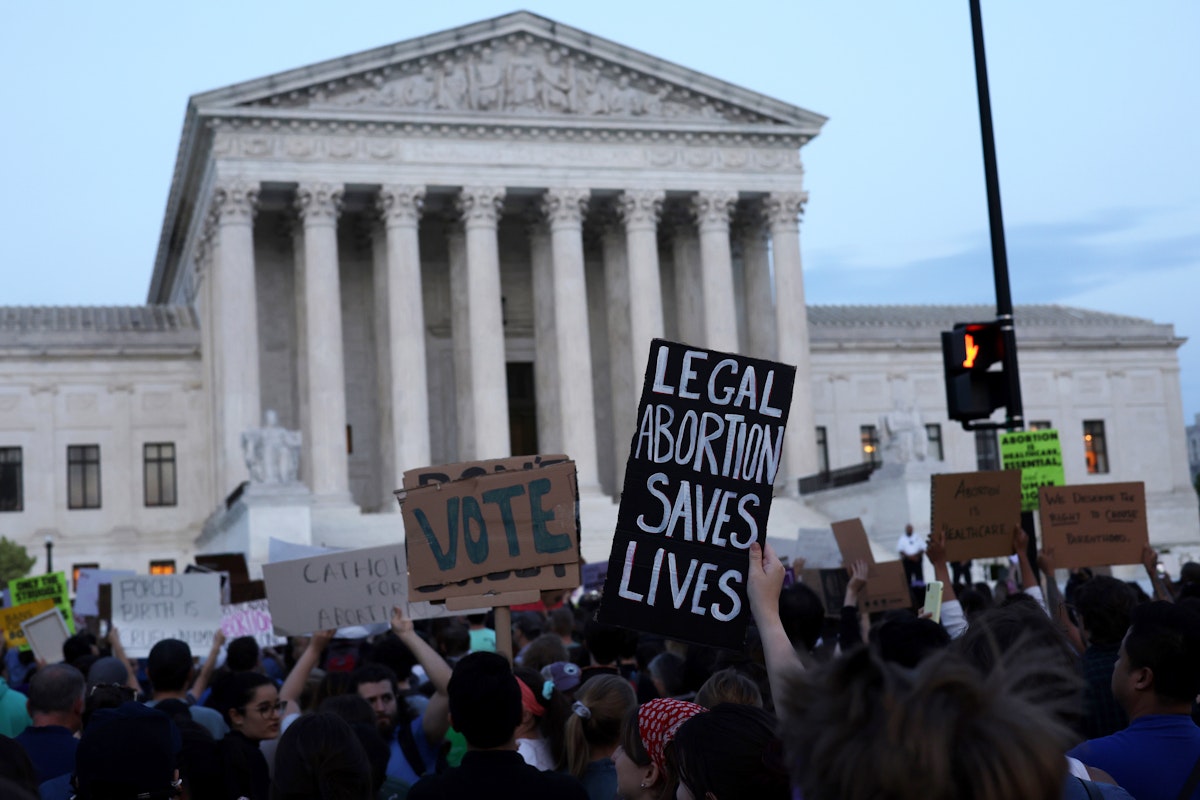We Now Have More Damning Evidence of the Devastation Caused by the End of Roe v. Wade
A new study found that the number of people who travel out of their home state for an abortion has doubled since the nationwide right to the procedure was rolled back.Nearly one in five patients traveled out of state for abortion care in the first six months of the year, according to a study released Thursday by the Guttmacher Institute. In comparison, during the same period in 2020 (two years before Roe v. Wade was overturned), just one in 10 patients had to travel for care.“We knew that more people have been traveling across state lines for abortion since the end of Roe, but these findings are stunning nonetheless, and powerfully illustrate just how disruptive the overturning of Roe has been for tens of thousands of abortion patients,” Isaac Maddow-Zimet, a Guttmacher data scientists and the study lead, said in the press release.The study found that people who have to travel tend to be from states with total abortion bans or short windows when abortions are allowed. The patients then travel to neighboring states with more open abortion rules. Some of the most popular states for abortion seekers in the first half of 2023 include Florida, Illinois, Kansas, Colorado, and North Carolina.Researchers also noted that their study does not “capture the experiences of people for whom abortion bans or increased restrictions have proven impossible to navigate.” This includes people who can’t afford to travel or are unable to due to disability. People of color tend to be hit hardest by abortion bans because of “persistent racial and economic oppression.”Within a month of Roe being overturned, Colorado abortion clinics reported that wait times had doubled due to the surge in out-of-state patients. In 2023, though, Illinois saw the largest increase in out-of-state patients because it borders Indiana, Kentucky, and Missouri, all of which have completely banned abortion. The most popular states for abortion seekers has likely changed, though, after North Carolina Republicans in May successfully forced through a law banning abortion after 12 weeks. In Florida, the state’s 15-week abortion ban went before the state Supreme Court in September. If the court upholds the law, then an even more restrictive measure banning abortion at six weeks—before most people know they are pregnant—will go into effect. Florida Governor Ron DeSantis signed the hugely unpopular bill in April.Abortion travel may also be affected by the growing “brain drain” out of Republican-led states. Young professionals such as ob-gyns have begun leaving red states due to restrictive GOP laws and threats of repercussions for simply doing their job. If someone needs an abortion and lives in a state where the procedure is technically legal, they may still need to travel out of state because there just isn’t anywhere to get an abortion nearby.

A new study found that the number of people who travel out of their home state for an abortion has doubled since the nationwide right to the procedure was rolled back.
Nearly one in five patients traveled out of state for abortion care in the first six months of the year, according to a study released Thursday by the Guttmacher Institute. In comparison, during the same period in 2020 (two years before Roe v. Wade was overturned), just one in 10 patients had to travel for care.
“We knew that more people have been traveling across state lines for abortion since the end of Roe, but these findings are stunning nonetheless, and powerfully illustrate just how disruptive the overturning of Roe has been for tens of thousands of abortion patients,” Isaac Maddow-Zimet, a Guttmacher data scientists and the study lead, said in the press release.
The study found that people who have to travel tend to be from states with total abortion bans or short windows when abortions are allowed. The patients then travel to neighboring states with more open abortion rules. Some of the most popular states for abortion seekers in the first half of 2023 include Florida, Illinois, Kansas, Colorado, and North Carolina.
Researchers also noted that their study does not “capture the experiences of people for whom abortion bans or increased restrictions have proven impossible to navigate.” This includes people who can’t afford to travel or are unable to due to disability. People of color tend to be hit hardest by abortion bans because of “persistent racial and economic oppression.”
Within a month of Roe being overturned, Colorado abortion clinics reported that wait times had doubled due to the surge in out-of-state patients. In 2023, though, Illinois saw the largest increase in out-of-state patients because it borders Indiana, Kentucky, and Missouri, all of which have completely banned abortion.
The most popular states for abortion seekers has likely changed, though, after North Carolina Republicans in May successfully forced through a law banning abortion after 12 weeks. In Florida, the state’s 15-week abortion ban went before the state Supreme Court in September. If the court upholds the law, then an even more restrictive measure banning abortion at six weeks—before most people know they are pregnant—will go into effect. Florida Governor Ron DeSantis signed the hugely unpopular bill in April.
Abortion travel may also be affected by the growing “brain drain” out of Republican-led states. Young professionals such as ob-gyns have begun leaving red states due to restrictive GOP laws and threats of repercussions for simply doing their job. If someone needs an abortion and lives in a state where the procedure is technically legal, they may still need to travel out of state because there just isn’t anywhere to get an abortion nearby.



